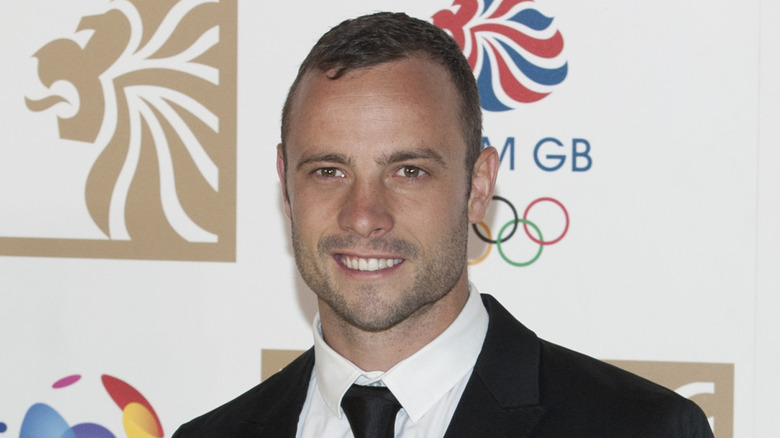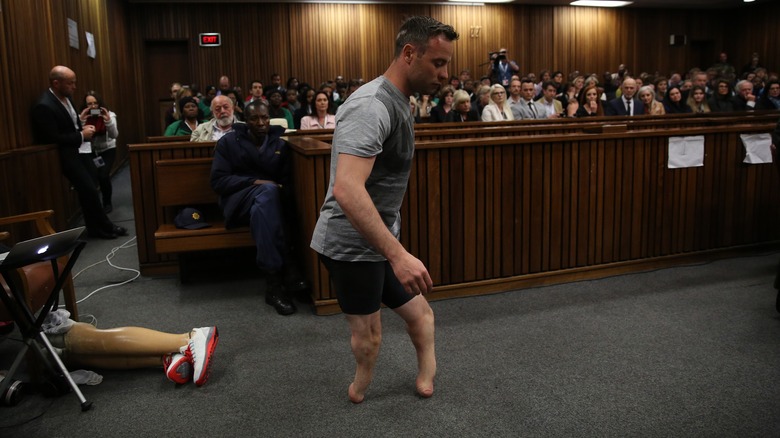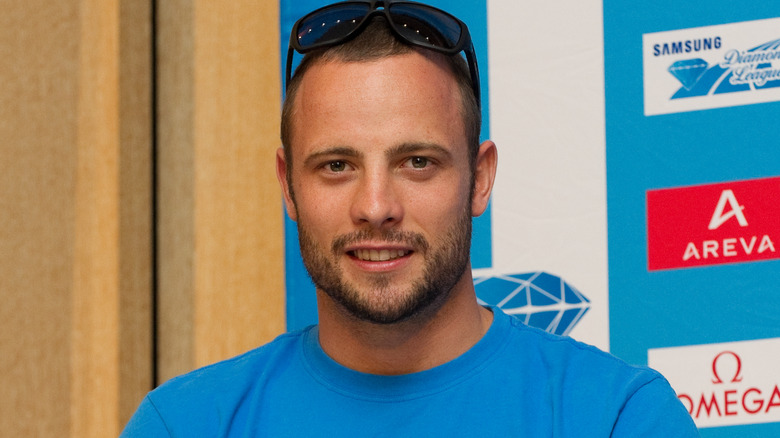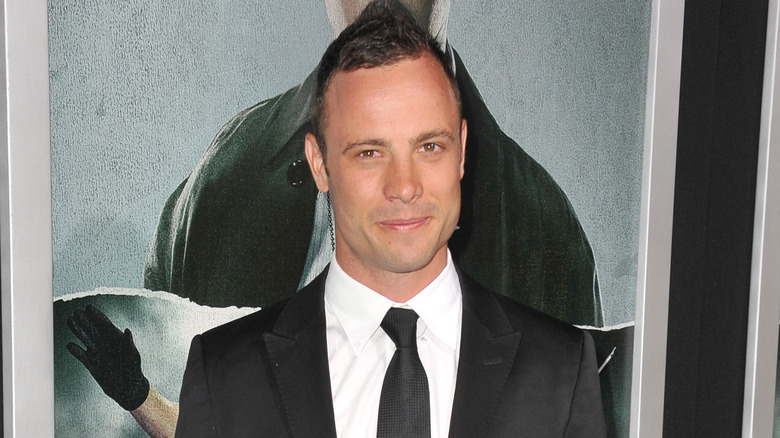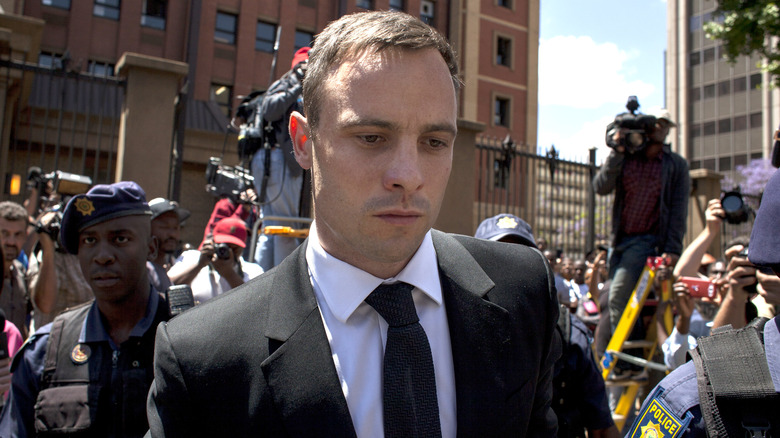Inside Oscar Pistorius' Life In Prison
The following article includes a brief mention of suicidal ideation.
The list of admired athletes who have done awful things is, unfortunately, a long one — and at the top is Oscar Pistorius. The South African sprinter, who had his legs amputated below the knees when he was just 11 months old, made history in 2012 when he became the first amputee runner to compete at the Olympics. The eight-time Paralympic medalist captivated audiences as he took part in the men's 400-meter qualifiers and even advanced to the semifinals, but his world crashed around him soon after.
On Valentine's Day 2013, Pistorius shot and killed his girlfriend, Reeva Steenkamp, inside his home. He maintained it was a horrible accident and said he thought Steenkamp, whom he shot through his bathroom door, was an intruder. Meanwhile, prosecutors argued he acted intentionally after a heated argument. The trial that followed made headlines around the world, and Pistorius was initially found guilty of culpable homicide. His sentence was later upgraded to murder by an appellate court, which allegedly sent Pistorius into a tailspin and landed him on suicide watch in August 2016.
While his case made its way through South Africa's legal system, Pistorius experienced everything from house arrest to a maximum-security prison to a jail that's been described as family oriented. Here's what Oscar Pistorius' life behind bars has been like through the years, and what it's like today.
If you or someone you know is struggling or in crisis, help is available. Call or text 988 or chat 988lifeline.org.
Oscar Pistorius began his sentence at a notorious prison
Oscar Pistorius was found guilty of culpable homicide in September 2014 and sentenced to five years in prison that October. The disgraced Olympian was then sent to serve his time at Kgosi Mampuru II, a maximum-security prison in Pretoria, South Africa that's home to some of the country's most dangerous individuals. The facility is notorious for gangs and violence, but Pistorius was quickly isolated from it all. Fellow inmate Boswell Mhlongo told NBC News, "He was a VIP prisoner." He alleged the former sports star received special treatment because of his fame, noting, "He can do whatever he wants."
However, authorities clarified, per CNN, that Pistorius' physical limitations were the real reason for his being housed in a private cell inside the prison's hospital wing. Early on, Pistorius met with Boitumelo Morake and Violet Ngobeni from the Judicial Inspectorate, an independent inspector of correctional services, who told CNN that all of his requests were indeed met. He asked for a bath, upgraded gym equipment, a better bed — and got it all. He was even allowed to cook his own food, although he eventually decided to rely on the prison store's processed food items. "Oscar was worried that the food in the prison might be poisoned and that it would affect his health," the Judicial Inspectorate's regional manager Murasiet Mentoor shared.
And while Pistorius was angry at spending 23 hours a day in his cell, Morake mused, "At the hospital section, it is very secure and where he is, it is very clean — it's nice and neat."
He got a brief reprieve under house arrest
Under South African law, Oscar Pistorius was eligible to be transferred to house arrest after serving one-sixth of his sentence (or 10 months). Given how he was considered low risk and a model inmate, his petition was granted in August 2015, but a local women's group halted the transfer. Justice and Correctional Services Minister Michael Masutha temporarily hit pause on Pistorius' release, per CNN, but a parole board eventually granted it that October. The Paralympian had served a year minus a day behind bars and was allowed to spend the remaining four years of his sentence under house arrest at his uncle's home, which ABC News reported was more of a mansion (complete with a pool house!) located in a swanky part of Pretoria.
But while the former Olympian was being released from prison, BBC News noted that he would have to follow a number of rules. Namely, Pistorius had to continue his psychotherapy sessions, take part in community service, and stay far away from guns, alcohol, and drugs. However, the outlet noted he would not wear a monitoring device and would likely be allowed to go out for short periods of time during the day to the gym, church, and even local stores. All the while, a probation officer would check on him regularly.
Many slammed the terms as too lenient. Reeva Steenkamp's cousin, Kim Martin, told the outlet, "For somebody who shot somebody behind a door four times, that's getting off lightly."
The Blade Runner was moved back to prison
While Oscar Pistorius was serving the remainder of his five-year culpable homicide sentence under house arrest, the Supreme Court of Appeal overturned his previous verdict and found him guilty of murder in December 2015. In July 2016, he was sentenced to six years, despite the minimum sentence calling for 15 years. He was returned to Kgosi Mampuru II from his uncle's mansion, then eventually transferred to the low-security Atteridgeville Correctional Centre near Pretoria in November 2016. As the Daily Mail noted, it's a place for non-violent offenders and was better suited to his physical needs. In addition to having a private cell with an adapted en-suite bathroom, Pistorius was granted some special privileges, like being allowed to grow his own food in the gardens surrounding the facility. However, senior barrister Dr. Llewelyn Curlewis stressed the exceptions were not made because of his fame. "Pistorius is regarded as a special case, not because he is famous, or now notorious, but because he is a double amputee," he told the outlet.
Jump to November 2017, and the Supreme Court of Appeal extended Pistorius' sentence to 15 years minus time served, amounting to 13 years and five months behind bars.
In February 2023, the Mirror learned Pistorius was reportedly staying in shape and working on the prison's farm, which sells its produce to help feed kids in need. "He has been seen driving a red tractor in fields around the prison, being trained to plough a straight furrow," a source claimed.
Oscar Pistorius has embraced religion and gardening
When he's not spending time in his cell, Oscar Pistorius is reportedly involved in a number of (surprising) inmate activities. Even before he learned how to farm, the athlete was allegedly giving gardening his all. When Oscar's father, Henke Pistorius, spoke with The Times in December 2018, he said his son had been given a piece of land to plant a vegetable garden — and loved it. "Oscar, being an artist, didn't just do square blocks of vegetables," his dad revealed. "He has designed a face: the hair is certain type of veggies and the ears and mouths are something else."
His biggest pastime, however, appears to be religion. Henke shared that Oscar, whom he claimed had "always been a true child of God," had become an invaluable spiritual leader, helming a weekly Bible study and prayer group. "I have no doubt that Oscar has changed the environment in the prison for the better," he mused. "He is helping to mediate between people and is having a positive influence." Henke added that the men who attend the group are "the problem people in the prison" and praised, "Oscar leads the studies and is able to accommodate those who aren't so familiar with the Bible to explain the meaning of all the verses."
The former Olympian was hurt in a prison brawl
Oscar Pistorius is serving his sentence in a small prison with only 1,000 inmates, in which he's likely the only person convicted of a crime as serious as murder. And yet, his time at Atteridgeville Correctional Centre hasn't been without altercation. Despite a source telling the Daily Mail that it has a "relaxed, family atmosphere," the prison sees fights like any other, and the former Paralympian was left banged up and bruised following a confrontation in December 2017.
Prison department spokesman Singabakho Nxumalo shared, per BBC News, that Pistorius and another inmate allegedly got into a fight "over the use of a public phone in the special care unit where both offenders are detained." As The Guardian reported, the issue reportedly arose when inmates became angry over Pistorius having a phone conversation that ran too long for their liking. A physical fight broke out, but the professional sprinter was the only one who was left with a bruise. Nxumalo also confirmed that an official investigation had been launched to "establish the facts and to ensure that appropriate action is taken as incidents of assaults are not allowed."
Oscar Pistorius has been moved back and forth between facilities
An integral part of South Africa's justice system is a program called Victim Offender Dialogue (VOD), in which victims of crimes (or their relatives) are given the opportunity to meet with offenders. The idea is for both parties to talk openly and try to find closure. It's a step that must be completed before an inmate can ask for parole, and in the case of Oscar Pistorius and the Steenkamp family, both sides agreed to take part in VOD.
While Reeva Steenkamp's mother, June Steenkamp, wrote a letter to be read to Pistorius, Reeva's father, Barry Steenkamp, decided to meet with the Blade Runner in person. So, in November 2021, Pistorius was temporarily moved to St. Albans Correctional Centre, close to where the Steenkamps live. That's where he and Barry met in June 2022. Following a difficult encounter, Barry claimed Pistorius "wailed like a child," per the Daily Mail, but slammed him for not taking accountability. "I told Oscar directly that he had shot my daughter deliberately and he denied it," Barry told the outlet. Instead, Pistorius allegedly maintained he believed he was shooting an intruder. "After all these years we are still waiting for him to admit he did it in anger — that is all we wanted," said Barry.
In July 2022, with the VOD complete, Pistorius was transferred back to Atteridgeville Correctional Centre.
He's been allowed to leave prison on several occasions
Folks may be surprised to learn that Oscar Pistorius has been allowed to leave prison on three occasions, but it has nothing to do with special treatment. As News24 reported in November 2018, the disgraced Paralympian was granted compassionate leave to attend a memorial service for his 101-year-old grandfather, Hendrik Pistorius. Singabakho Nxumalo, a spokesperson for the Department of Correctional Services, explained it's a common privilege granted to inmates who are low risk, well-behaved, and take their rehabilitation seriously whenever a direct family member dies.
Another source from the department told South African publication Weekend Argus (via IOL) that Pistorius fit the bill as a seemingly "humble and caring" man who's nothing like he's depicted in the media. "The Oscar I've come to know in jail is kind-hearted and cares for his fellow inmates," the insider claimed. "He buys food for those who can't afford it or those who are far away from their relatives, and he does this without asking for anything in return." Adding that he's often misjudged, the source shared how Pistorius spends most of his time reading or picking out books at the prison library — "He's a real bookworm" — and mused, "Oscar also doesn't deny what he did and shows remorse every day without faking it or to manipulate people's opinions."
Pistorius was previously granted compassionate leave on two other occasions: First in August 2016 to attend a memorial service for Hendrik's wife, Gerti Pistorius, then in August 2017 to attend his other grandmother Joyce Bekker's funeral.
What Oscar Pistorius' future looks like
Oscar Pistorius became eligible for parole after serving half of his prison sentence and, in August 2022, he petitioned a court for early release, saying he had already surpassed that requirement. Indeed, a court ruled in 2021 that the start of his prison term was to be backdated to October 2014, the time of his initial conviction. In an official statement to the court, which was seen by News24, Pistorius argued, "I humbly submit that I have done everything in my power to rehabilitate, to conduct myself in such a manner as to constantly comply with prison rules, to show full remorse." Reeva Steenkamp's mother, June Steenkamp, disagreed. Ahead of the court's ruling, she told Sky News, "He's not remorseful or rehabilitated."
A decision wasn't reached until March 2023, when Pistorius was denied parole and told he actually wouldn't be eligible to apply until August 2024. Prison spokesperson Singabakho Nxumalo stated to the press (via Reuters), "He will have to appear again next year and then we look into the profile and make a decision in terms of his placement."
Meanwhile, the Mirror learned that Oscar Pistorius may be moved to yet another prison before that happens, because there are plans to turn Atteridgeville Correctional Centre into a women-only facility.

